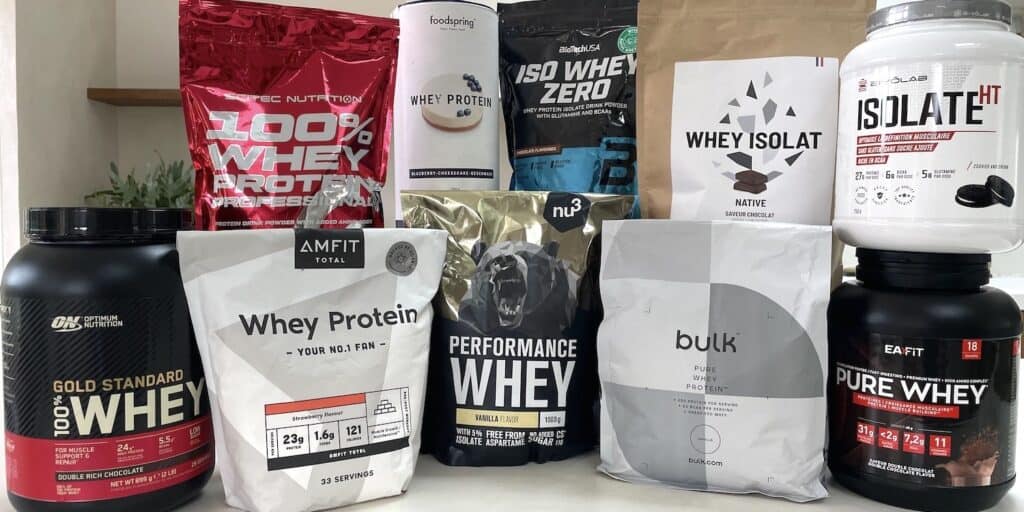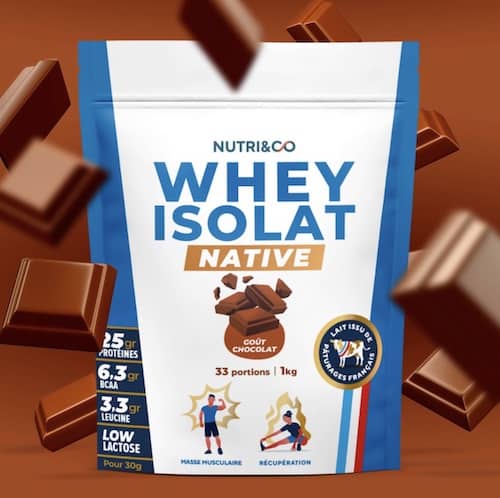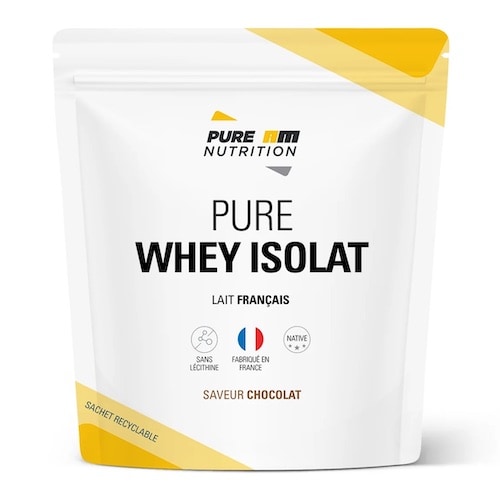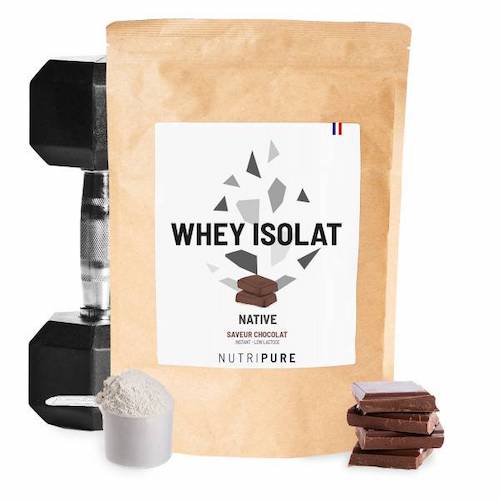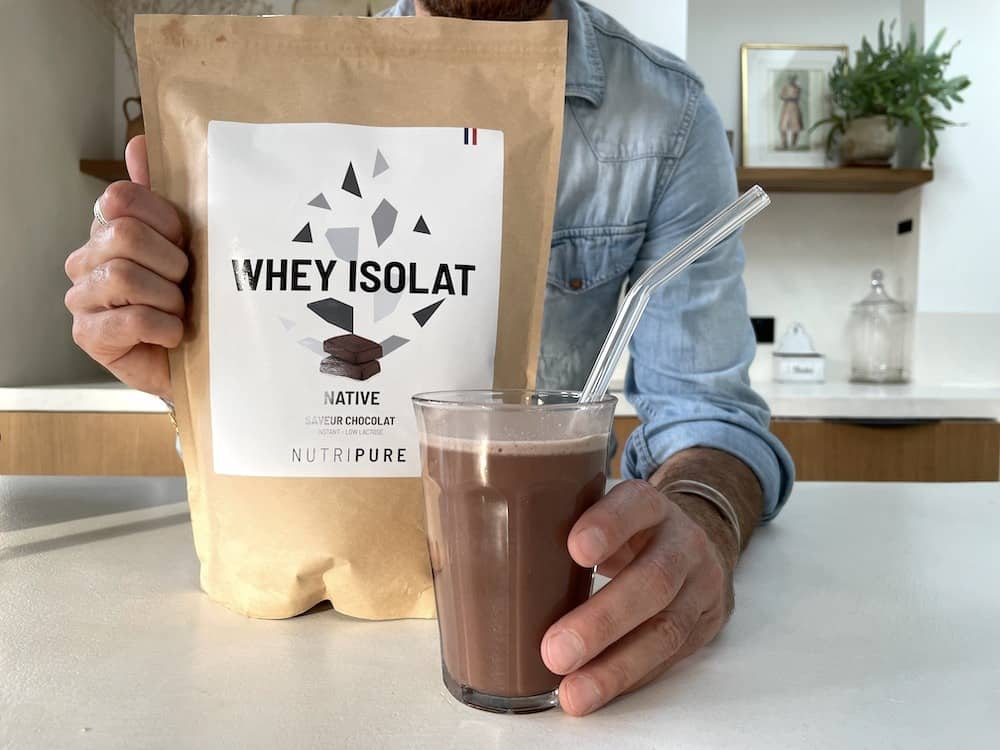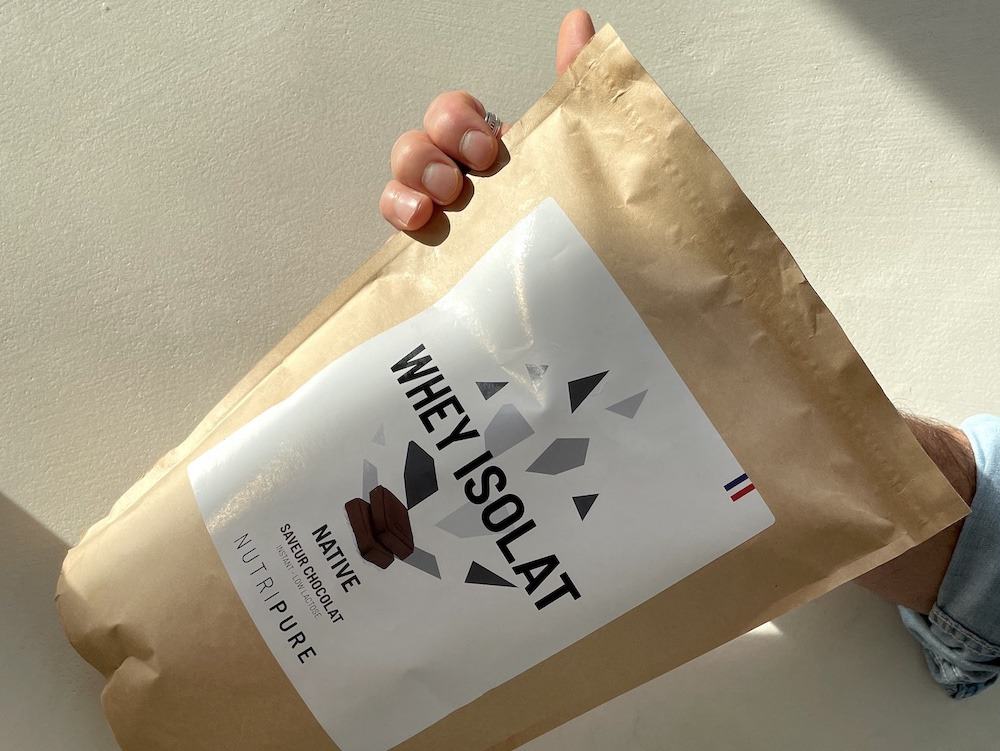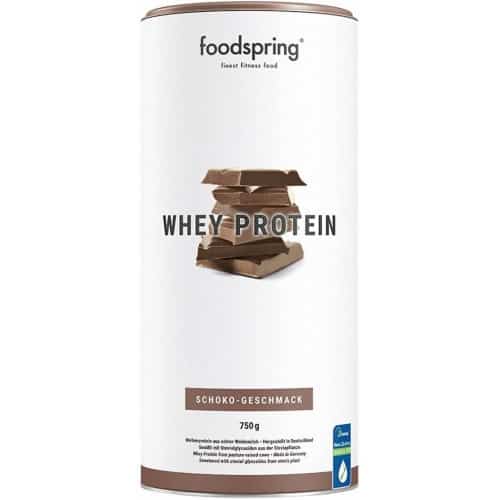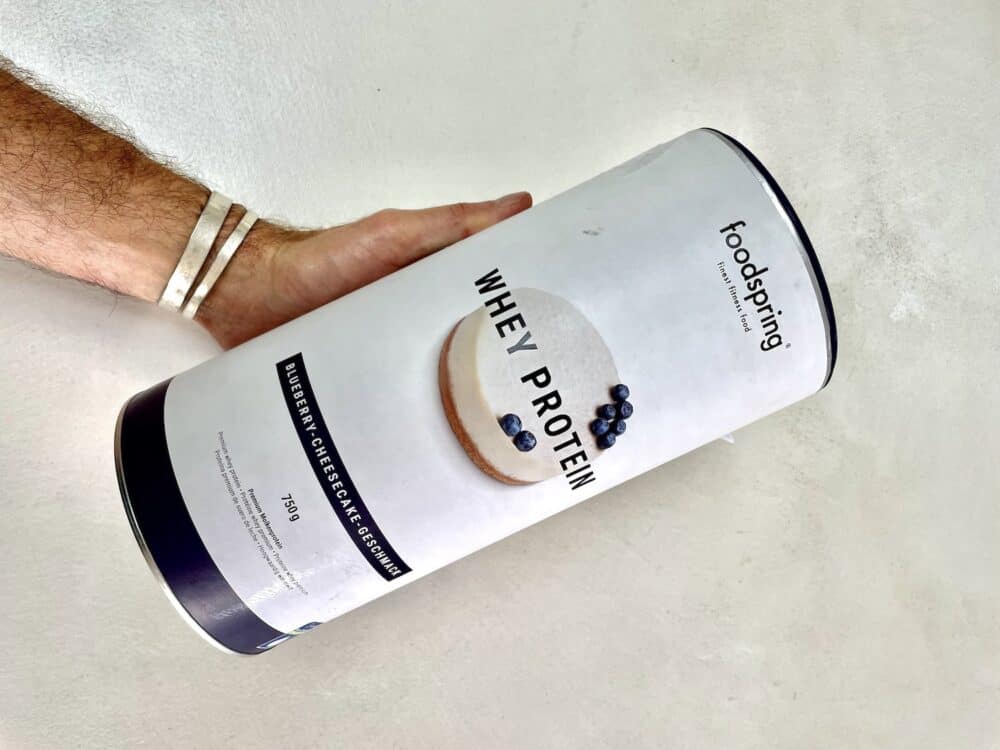Summary of my selection
#1: Best Whey 🥇
> Native Whey Isolate – Nutri&Co
#3: Best premium alternative
> Native Whey Isolate – Nutripure
Whey is obtained from the dairy industry, it’s derived from milk serum, or whey. The serum is obtained during the coagulation of milk in the cheese-making process.
This serum mainly contains lactose and small soluble proteins rich in essential amino acids. Its biological value (the rate of assimilation and quality of amino acids) ranges from 104 to 114, making it one of the best proteins.
This helps us understand why athletes have made it a habit to consume it to meet their protein needs and to increase their muscle mass.
But there are many types of whey, and even more brands: it’s increasingly complicated to navigate through the labels and therefore to make the right choice.
{{{TEMP_MARK_44}}}Brands tested: AMFIT, BiotechUSA, Bulk, EAfit, Eiyolab, Foodspring, NU3, Nutri&Co, Nutripure, Optimum Nutrition, Pure AM nutrition, Scitec Nutrition
We independently evaluate all dietary supplements. If you click on one of the suggested links, a commission may be paid to us, without affecting the price or ranking.
My 6 selection criteria
{{{TEMP_MARK_53}}}Each criterion is rated out of 5, and the average of the 6 criteria determined my selection.
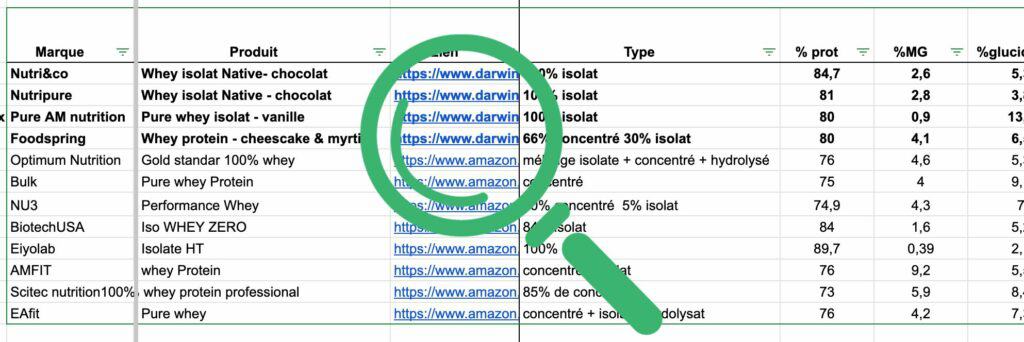
→ Access my full comparison chart here (Google Sheet)
1. Nutritional value
To assess the nutritional value of a whey, I relied on the protein content on one hand, and the amount of BCAA on the other.
{{{TEMP_MARK_39}}}2. Safety
To rate the safety of different wheys, I based it on 4 sub-criteria:
- The source of the milk used and the way the cows are fed. Thus, pasture-fed or grass-fed cows produce higher quality milk than those from intensive farming.
- Native quality or not. When the Whey is native, filtration is done cold, which helps maintain the protein’s integrity.
- The number of additives and texturizing agents. Most of the texturizing agents used aren’t controversial, but their presence in large quantities is not ideal for the body. Ideally, it’s best to consume products with the shortest recipe possible.
-
{{{TEMP_MARK_38}}}
3. Brand reputation
{{{TEMP_MARK_43}}}I also relied on the Instagram community and reviews found on Amazon and review sites such as Trustpilot or Verified Reviews.
A whey that mixes well and doesn’t clump is pleasant to consume. Therefore, I tested the solubility of the 10 brands by mixing 30 g of whey into 250 ml of water in a shaker. An identical mixing time of 10 seconds was used for each whey.
5. Taste
This part is more subjective, so I based it on my personal tastes!
I evaluated:
- The texture, favoring creamy textures
- The strength of the sweet taste, favoring less sweet wheys.
- The naturalness of the taste, favoring natural tastes and penalizing overly artificial ones
6. Packaging durability
Because waste reduction concerns us all, I also evaluated the type of packaging used, favoring brands that limit the use of plastic.
Best whey: my opinion
#1: BEST WHEY 🥇
Nutri&Co: 4.7/5
Nutrition : ★★★★★
Sécurité : ★★★★★
Marque : ★★★★☆
Solubilité : ★★★★★
Goût : ★★★★★
Pack : ★★★★☆
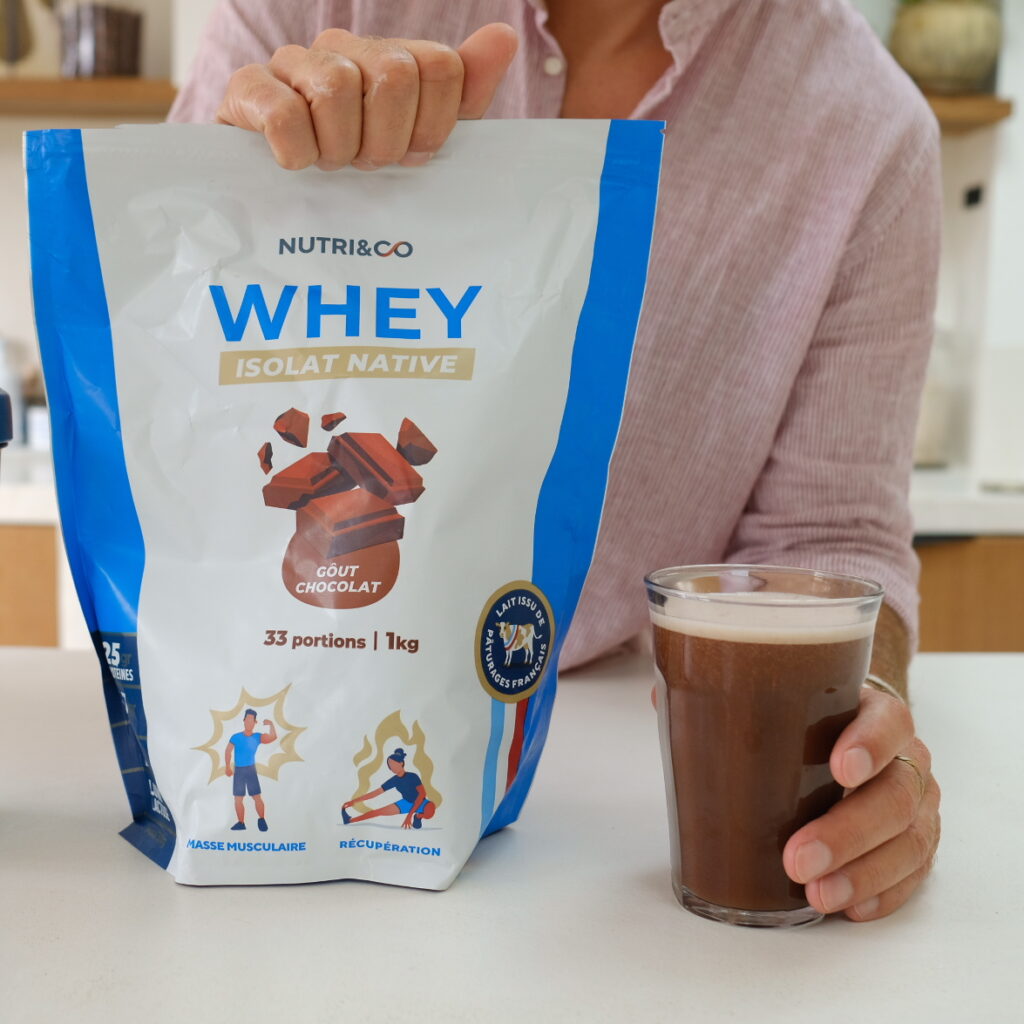
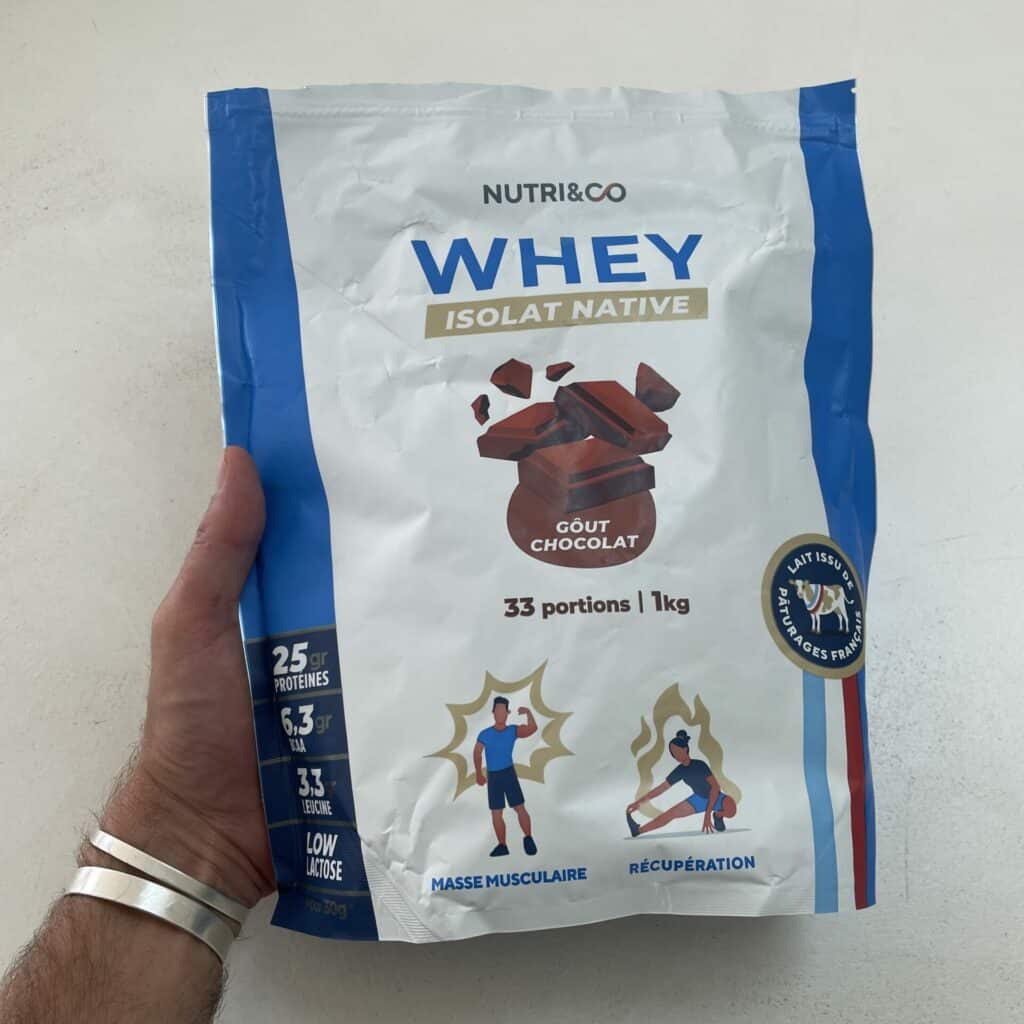
Nutri&Co is a French brand established in 2017. It specializes in selling dietary supplements aimed at improving health, beauty, and sports performance. Its goal is to provide the best possible quality with simple formulas and no controversial ingredients, at a fair price.
The chocolate-flavored isolate and native whey from Nutri&Co contains 85 g of protein per 100 g with 24.8 g of BCAA. This composition is very rare for whey, indicating an exceptional quality of milk.
Nutri&Co whey is native, meaning it doesn’t come from the curds of the cheese industry but directly from milk. The proteins are cold-extracted through micro-filtration, preserving their quality.
The milk from which the whey is derived comes from French pasture-raised cows, which is the best possible quality for whey currently.
{{{TEMP_MARK_80}}}The brand has chosen not to use chemical sweeteners. For the sweet flavor, only steviol glycoside (a natural sweetener from stevia) is used.
{{{TEMP_MARK_83}}} {{{TEMP_MARK_73}}}#2: BEST VALUE FOR MONEY
PURE AM Nutrition: 4.3/5
Nutrition : ★★★★☆
Sécurité : ★★★★☆
Marque : ★★★★☆
Solubilité : ★★★★☆
Goût : ★★★★★
Pack : ★★★☆☆
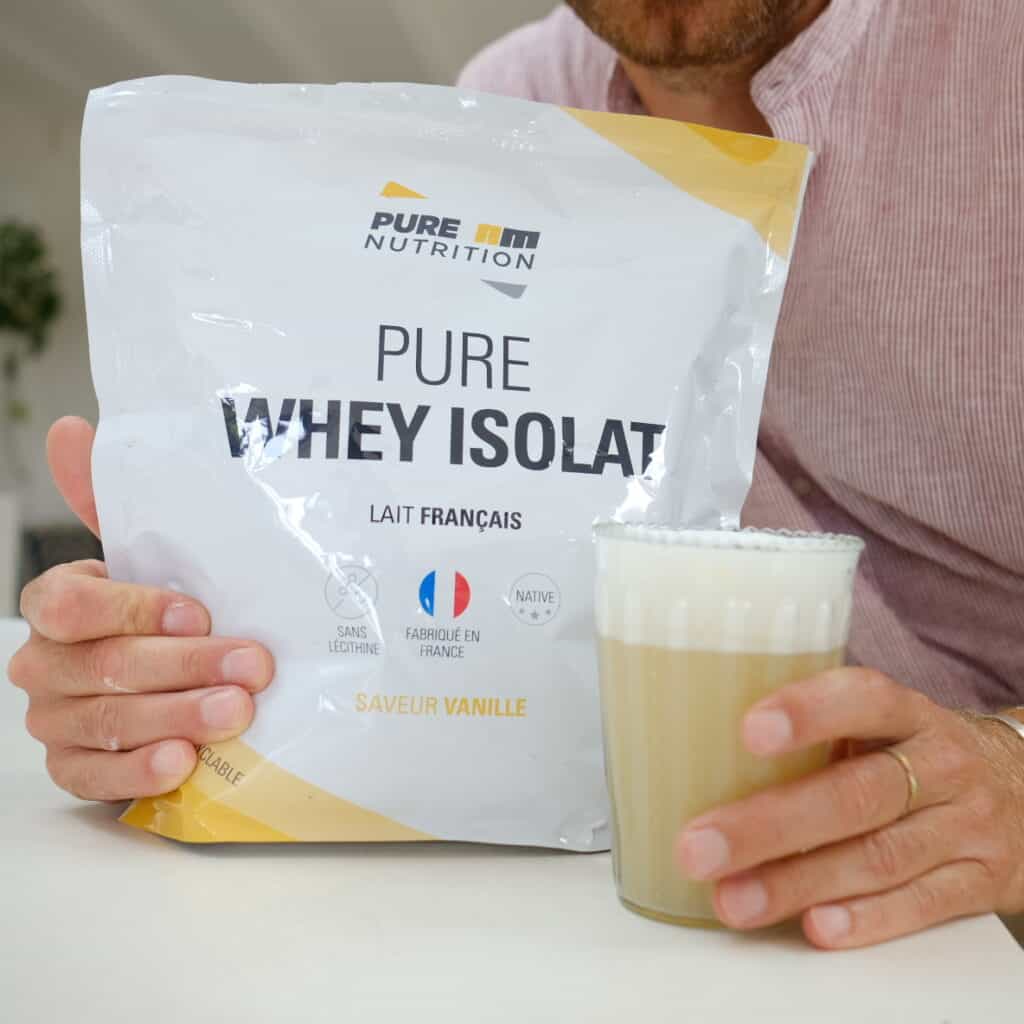
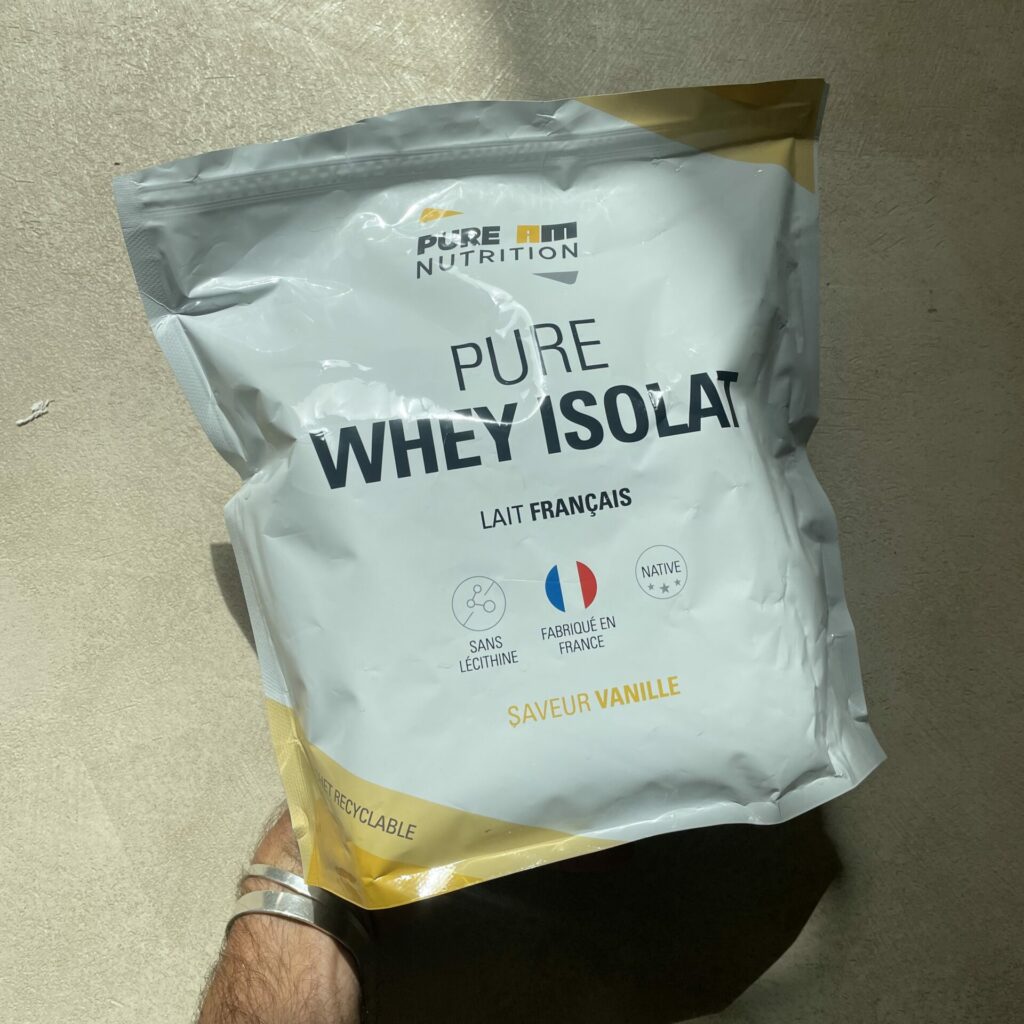
PURE AM Nutrition is a French brand established in 2017, specializing in dietary supplements for athletes. Its mission is to offer quality products with simple compositions at unbeatable prices.
The isolate whey from AM Nutrition contains 85 g of protein per 100 g with 19 g of BCAA. This whey is of excellent quality.
It contains few lipids 0.9 g/100 g and 10.4 g of carbohydrates. This is uncommon for an isolate. It indicates a higher lactose content than some isolates, which may be problematic for sensitive or intolerant individuals.
AM Nutrition whey is native, not derived from a by-product of the cheese industry but directly from milk. Thus, it is of superior quality because no heat treatment is used for protein extraction. The milk used is French.
{{{TEMP_MARK_26}}}I tested the AM Nutrition vanilla-flavored whey. I liked its pleasant and adequately sweet taste. I was less a fan of its rather liquid and frothy surface texture, with some lumps, which probably comes from the absence of texture agents in the formula.
{{{TEMP_MARK_75}}}In my opinion, it is the whey with the best value for money.
#3: BEST PREMIUM ALTERNATIVE
Nutripure: 4.7/5
Nutrition : ★★★★★
Sécurité : ★★★★★
Marque : ★★★★☆
Solubilité : ★★★★★
Goût : ★★★★☆
Pack : ★★★★★
Nutripure is a French brand created in 2017 by two high-level athlete brothers. Their ambition is to create “perfect” dietary supplements, meaning free of controversial substances and of optimal quality.
Nutripure Native Whey Isolate cocoa flavor contains 81 g of protein per 100 g with 17.9 g of BCAAs per 100 g. It also contains 2.8 g of fat and 3.8 g of carbohydrates. The carbohydrates come from the presence of cocoa powder and not from lactose since it contains less than 0.2%.
This whey is native, derived from fresh pasture-raised French milk. The proteins are isolated by cold microfiltration, thus remaining intact and not denatured by heat treatment.
Nutripure discards any controversial substance. For taste, the brand uses natural aromas and only one natural sweetener, steviol glycoside. Derived from stevia, this sweetener is the safest on the market.
The powder mixes very well, doesn’t clump, and tastes really good. The cocoa content of the product adds a gourmet touch without an artificial aftertaste.
{{{TEMP_MARK_47}}} {{{TEMP_MARK_84}}}4. BEST CONCENTRATED WHEY
Foodspring: 4.3/5
Nutrition : ★★★★☆
Sécurité : ★★★★☆
Marque : ★★★★★
Solubilité : ★★★★☆
Goût : ★★★★★
Pack : ★★★★☆
Foodspring is a German brand specializing in fitness food created in 2013. Their specificity is to offer consumers products adapted to sports practice with gourmet and original flavors. The products aim to be of premium quality and free of controversial substances.
This whey is a mix of 66% whey protein concentrate and 30% whey protein isolate. It contains 80 g of protein per 100 g.
Its BCAA content is 18.2 g per 100 g, which is an excellent average.
It also contains 4.1 g of fats and 5 g of carbohydrates, mainly supplied by lactose.
The premium quality of this whey is explained by its origin. Indeed, it is 100% sourced from pasture-raised New Zealand cows.
The cows are raised outdoors and exclusively feed on grass. As a result, the nutritional quality of the milk is high, particularly in terms of protein and fatty acids content.
From an ecological point of view, grass-fed cows produce less methane than those fed with corn or soy, which significantly reduces the impact on greenhouse gas production.
However, it is a pity that this milk does not come from Europe.
Regarding sweeteners, the brand uses a mix of sucralose (a synthetic sweetener) and steviol glycoside (a natural sweetener from stevia). The combination of the two is a good choice to provide a pleasant taste and limit the excessive use of controversial sweeteners.
I find that the solubility of the whey is excellent. Among the 15 existing flavors, I tasted the “blueberry/cheesecake” flavor. It was pleasant and not too sweet, with a good natural blueberry taste. I did not notice any unpleasant aftertaste, which is sometimes found with this type of product.
From a packaging perspective, I really liked its modern touch and the little plastic used. It’s a cardboard tube coated with aluminum film. To limit waste production, the brand chose not to include a scoop in the package, which can be inconvenient for first-time use.
The only downside remains the price, which is a bit high compared to the market average: €44/kg.
Complete comparison
| Rating | Price/kg | %prot | |
|---|---|---|---|
| 1. Nutri&Co – Native Whey Isolate | 4.7 | 50 | 83 |
| 2. Nutripure – Native Whey Isolate | 4.7 | 53 | 81 |
| 3. Pure AM Nutrition – PURE Whey Isolate | {{{TEMP_MARK_176}}} | 43 | 80 |
| 4. Foodspring – Whey protein | {{{TEMP_MARK_176}}} | 44 | 80 |
| {{{TEMP_MARK_138}}} | 4.0 | 39 | 76 |
| 6. Bulk – Pure whey Protein | 3.8 | 38 | 75 |
| 7. NU3 – Performance Whey | 3.8 | 25 | 74.9 |
| {{{TEMP_MARK_143}}} | 3.8 | 48 | 84 |
| 9. Eiyolab – Isolate HT | 3.7 | 47 | 89.7 |
| 10. AMFIT – whey Protein | 3.7 | 26 | 76 |
| 11. Scitec Nutrition – 100% whey | {{{TEMP_MARK_184}}} | 48 | 73 |
| 12. EAfit – Pure whey | 3.2 | 39 | 76 |
→ Access my full comparison chart here (Google Sheet)
The different types of whey
Concentrated whey
Concentrated whey is the most used and sold whey. It mainly comes from the cheese industry.
During cheese production, casein (solid proteins used in the making of cheese) is separated from the whey through high-temperature thermal treatment. This treatment denatures a part of the proteins. The whey is then dehydrated to give concentrated whey.
{{{TEMP_MARK_81}}}Native whey
Native whey is a whey that does not come from the cheese industry, whey is separated from casein by cold filtration directly from milk. There is no denaturation of proteins.
Its digestibility and assimilation are better than concentrated whey, but it is more expensive.
Whey isolate
{{{TEMP_MARK_25}}}It is particularly interesting for people intolerant to lactose, or people wanting to consume the least amount of calories possible.
Its nutritional richness is exceptional as it contains about 90% protein, but its production cost is higher.
Note that a whey can be both native and isolate. It is the best quality on the market.
📚 Read also | Best whey isolate: the choice of a dietitian
Hydrolyzed whey
{{{TEMP_MARK_50}}}It is used to quickly provide proteins at the time of intense muscle effort.
The proteins it contains are therefore very rapidly absorbed and well tolerated. It is intended for people with digestive problems, or for athletes who require immediate protein intake.
Vegan whey
{{{TEMP_MARK_76}}}However, there is an increasing availability of plant-based protein powders, suitable for vegetarian or vegan diets. These products typically contain a blend of various types of plant proteins generally from peas, rice, hemp, soy, etc.
📚 Read also | Comparison of the best plant-based protein powders
Frequently Asked Questions (FAQ)
What is whey used for?
Whey is a protein substitute that helps meet increased needs during intensive athletic activities. Its amino acid composition is very interesting, making it a quality choice to promote good muscle growth.
Additionally, its proteins are small and quickly absorbed, making them immediately available after physical activity. This helps optimize recovery.
How much whey should you consume per day?
The amount of whey you need will depend on various factors: your protein needs, the level of your physical effort, your goals, and the amount of protein in your daily diet.
However, a person looking to increase their protein intake can start with 30g per day after a workout to promote muscle recovery.
How many times a day can you take whey?
This will once again depend on your protein consumption in your daily diet and your needs. It is impossible to generalize.
For example, a person who consumes a lot of meat products will not have the same needs as someone who eats very little.
Where to buy whey?
Whey can be purchased in specialized fitness stores but also in some large sports stores. It can also be found in some pharmacies.
For this test we bought the whey on Amazon or directly from the brands via their online shops.
When to take whey?
Ideally, it is better to take whey outside of meals, after exercising. It is also possible to consume it during a meal to enhance the protein intake.
Whey or casein?
Whey, or serum, comes from milk whey. It is composed of soluble milk proteins. These proteins are small, highly digestible and quickly assimilated, which is very useful for providing the muscles with the proteins they need.
Casein comes from the solid part found in dairy products (yogurt, cottage cheese, skyr, curd, etc.). Caseins are large proteins that take longer to be digested by the body. They are sometimes poorly tolerated.
The usage is not the same as whey: casein is generally used at night in addition to whey to provide proteins during the night, which prevents muscle catabolism.
Casein is recommended only for certain sports practices, such as bodybuilding with high protein needs.
Whey or BCAA?
If whey is of good quality, it contains a good amount of BCAA.
BCAAs are branched-chain amino acids that enable muscle building and recovery. There are 3 of them: valine, leucine, and isoleucine. They are called essential amino acids because the body cannot synthesize them alone. They must therefore necessarily come from food.
Without them, muscle building is impossible and other amino acids will not be well utilized.
Taking BCAA capsules before a workout can be beneficial to limit muscle catabolism during intense sessions. However, it is not necessary to add them to whey if it is of quality.
📚 Read also | Comparison of the best BCAA
Whey or creatine?
Creatine is an amino acid derivative, it is naturally present in the body and primarily in muscle fibers and the brain. It is synthesized by the kidneys, liver, and pancreas, from 3 amino acids: arginine, glycine, and methionine.
Creatine is an energy precursor for muscles, it helps to improve sports performance, especially in strength and bodybuilding sports.
It has nothing to do with whey which, in turn, helps improve recovery and muscle growth.
📚 Read also | What is the best creatine on the market?
Does whey make you lose weight?
No, whey is not designed to lose weight but to facilitate muscle mass growth. However, developing muscle mass increases your basal metabolism. In this context, whey can indirectly aid in fat loss as long as the body is in a caloric deficit.
Are there any dangers and contraindications to consuming whey?
If there is no excess and whey covers the body’s natural protein needs, there is no danger in consuming it.
For it to be beneficial and not harmful, whey consumption must be associated with a varied and balanced diet.
Caution: people suffering from kidney insufficiency need to control their protein intake. In this case, it is recommended not to consume it without medical advice.
Is whey essential for building muscle?
No, whey is absolutely not essential for muscle mass gain! It is entirely possible to do without it by being vigilant about your protein intake with traditional foods.
Whey is a practical and economical boost to meet your protein needs, but it is not essential.
Summary of my selection
#1: Best Whey 🥇
> Native Whey Isolate – Nutri&Co
#3: Best premium alternative
> Native Whey Isolate – Nutripure


